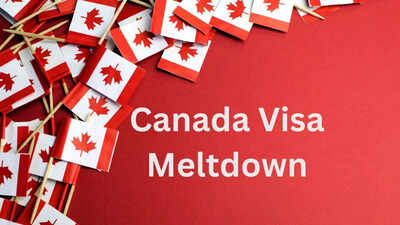A surge in rejections, automation concerns, and record court challenges are shaking the foundation of Canada’s famed immigration system.For a country that built its modern identity on welcoming newcomers, Canada is suddenly turning people away at historic rates. Visa refusals across visitor, study, and work categories have spiked sharply in 2025, leaving thousands stranded and fuelling a flood of court cases. Immigration lawyers say this isn’t a coincidence — it’s a policy shift quietly aided by algorithms.
Driving the news
New data from Immigration, Refugees and Citizenship Canada (IRCC) shows that between January and August 2025, 278,900 fewer people arrived in Canada compared to the same period last year.
- Study permits: down by 132,505 (nearly 60%)
- Work permits: down by 146,395 (around 56%)
- Visitor visas: also trending sharply lower
Experts link this plunge to automated decision-making tools like Chinook, which process applications in bulk using preset templates. Many refusal letters now read identically, with the same line repeating across thousands of cases:“I am not satisfied that the applicant will leave Canada at the end of their authorised stay.”
Why it matters
This is not merely a bureaucratic backlog. Lawyers say Canada’s shift from human to machine-assisted immigration screening has triggered a crisis of fairness and transparency. Generic decisions: Officers’ notes — often known as ODNs — now contain templated phrases instead of individual reasoning.Automation opacity: The use of internal tools like Chinook means applicants can’t tell how their profiles were weighed or scored.Policy pressure: Ottawa has openly vowed to “reduce the share of temporary residents,” and officials appear to be tightening criteria to meet that target.The outcome: one in every two temporary visa applications is being refused, according to regulated Canadian immigration consultant Kubeir Kamal.
| Category | Jan–Aug 2024 | Jan–Aug 2025 | Change | % Drop |
| New study permits | 330,000 | 197,495 | -132,505 | 60% ↓ |
| New work permits | 260,000 | 113,605 | -146,395 | 56% ↓ |
| Visitor visas (TRVs) | 520,000 | 450,000 | -70,000 | 13% ↓ |
| Total temporary entries | 1,110,000 | 831,100 | -278,900 | 25% ↓ |
In August 2025 alone, 45,380 study permits were approved — down from 79,795 a year earlier. Work permits fell from 26,075 to 16,890 in the same month.
When automation replaces discretion
At the heart of the debate is Chinook, a Microsoft Excel–based tool that allows visa officers to process files en masse.While IRCC insists that humans make final decisions, insiders say automation now streamlines — and effectively standardises — refusal notes.As a result, the Global Case Management System (GCMS) records, which applicants can request after a refusal, often mirror the same templated phrases used in letters. That has made it harder to contest decisions or prove procedural unfairness.
Judicial reviews on the rise
The fallout has been immediate.The Federal Court of Canada is on track to record 36,400 immigration filings in 2025 — a 47% increase from last year, and up nearly fivefold since 2019.Immigration lawyer Pushkar Prehar says the surge reflects a growing lack of confidence in administrative fairness:“The court checks if a decision was reasonable; if not, it sends the case back to another officer. Many of these cases end when the department admits the refusal was templated.”Judicial reviews have now become the only effective appeal mechanism for thousands of rejected applicants, particularly international students and entrepreneurs.
What happens when your visa is refused
Request GCMS notes:These internal files reveal how the officer assessed your case. Increasingly, though, even these notes are generic.Ask for reconsideration:Applicants can request a re-evaluation, but officers aren’t obligated to respond.File for judicial review:If the refusal shows procedural unfairness or unreasonable logic (e.g., ignoring evidence or assumptions without basis), you can challenge it in Federal Court.
- Step 1: Apply for leave to proceed.
- Step 2: If granted, an oral hearing is held before a judge.
Prehar cites a case where an Indian student with a master’s degree was denied a study permit for a Post-Baccalaureate Diploma in Finance because the officer questioned its “benefit.” The court ruled the refusal unreasonable and ordered a fresh review by another officer.
What’s next
Canada’s 2026–2028 Immigration Levels Plan, expected in the coming days, will further clarify how deep the cuts to temporary residents go.If Ottawa proceeds with reductions, experts warn of a systemic chill on foreign talent — with students, tech workers, and entrepreneurs caught in the crossfire of an algorithmic immigration experiment.Bottom line:Canada’s visa crisis is no longer about paperwork delays. It’s about whether the country that sells itself as the world’s fairest destination can still claim to be making human decisions. Go to Source


